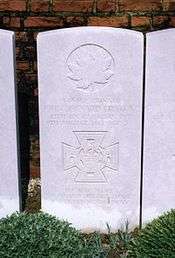John Croak
| John Croak | |
|---|---|
 | |
| Born |
18 May 1882 Little Bay, Newfoundland |
| Died | 8 August 1918 |
| Buried at | Hangard Wood British Cemetery, France |
| Allegiance | Canada |
| Years of service | 1915 – 1918 |
| Rank | Private |
| Unit | 13th (Royal Highlanders of Canada) Battalion, Canadian Expeditionary Force |
| Battles/wars | World War I † |
| Awards | Victoria Cross |

John Bernard Croak[1] VC (May 18, 1892 – August 8, 1918) was a soldier in the Canadian Army during the First World War and recipient of the Victoria Cross.
Details
Croak was born in Little Bay, Newfoundland, on May 18, 1892 to James and Cecelia Croak.[2] The family moved to Glace Bay, Nova Scotia when Croak was two years old. He attended school there and then began work as a coal miner.
Croak enlisted in the Canadian military in August 1915. He was a private in the 13th (Royal Highlanders of Canada) Battalion, Canadian Expeditionary Force. On August 8, 1918 at Amiens, France, Croak performed a deed which earned him the Victoria Cross. He was wounded in the act, and died that same day at the age of only 26. (Fellow 13th Royal Highlander Herman Good also won a Victoria Cross that same day.)
Citation
For most conspicuous bravery in attack when having become separated from his section he encountered a machine gun nest, which he bombed and silenced, taking the gun and crew prisoners. Shortly afterwards he was severely wounded, but refused to desist. Having rejoined his platoon, a very strong point, containing several machine guns, was encountered. Private Croak, however, seeing an opportunity, dashed forward alone and was almost immediately followed by the remainder of the platoon in a brilliant charge. He was the first to arrive at the trench line, into which he led his men, capturing three machine guns and bayonetting or capturing the entire garrison. The perseverance and valour of this gallant soldier,who was again severely wounded, and died of his wounds, were an inspiring example to all.— The London Gazette, No. 30922, September 24, 1918[3]
Further information
He is buried at Hangard Wood British Cemetery,[4] France which is located 12 miles south west of Albert.[2] In Glace Bay, Nova Scotia, where Croak grew up, there is a school, a park and a Royal Canadian Legion branch named in his honour. John Bernard Croak's medals are held by The Army Museum, located on the second floor of the Cavalier Block in the Halifax Citadel Defence Complex, Halifax, Nova Scotia, Canada.
See also
- Military history of Nova Scotia
- List of Canadian recipients of the Victoria Cross
References
- ↑ The Newfoundland spelling of the name is "Croke," and that is also how it appears on Pvt. Croak's birth certificate. However, Pvt. Croak enlisted with this spelling, which remains on many of his official documents.
- 1 2 Croak, John Bernard, Commonwealth War Graves Commission
- ↑ The London Gazette: (Supplement) no. 30922. p. 11430. 27 September 1918. Retrieved 27 April 2015.
- ↑ Wikimapia latitude/longitude: 49°50'12"N 2°30'28"E
External links
- JOHN BERNARD CROAK (service/personal details, citation, relevant documents, burial information)
- short citation
- Legion Magazine article on John Bernard Croak
- Find-A-Grave profile for John Bernard Croak
- Croak's Medals at the Canadian War Museum
- John Bernard Croak V.C. Memorial School info page
- John Bernard Croak V.C. Memorial School official page from Cape Breton-Victoria Regional School Board site